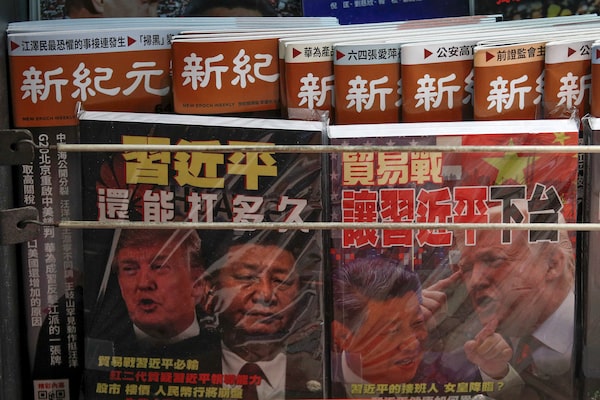
Chinese magazines with front covers featuring Chinese President Xi Jinping and U.S. President Donald Trump on trade war on sale at a roadside bookstand in Hong Kong, July 4, 2019.Andy Wong/The Associated Press
Hong Kong’s government announced an economic support package worth HK$19.1-billion (US$2.44 billion) on Thursday as escalating political protests and the prolonged Sino-U.S. trade war weigh heavily on the Asian financial centre.
Financial Secretary Paul Chan unveiled the plan at a news conference, after saying the government is expecting to lower its 2019 GDP growth forecast to zero per cent to 1 per cent, from the original 2 per cent to 3 per cent.
Mr. Chan said the measures include subsidies for the underprivileged and business enterprises, as well as somewhat higher salary tax rebates, but said the measures were not related to political pressure from the protests.
“It is prudent and reasonable to assume that the economic headwinds will continue to be very strong,” he said.
The Hong Kong government will release its latest economic forecasts along with second-quarter data on Friday, though analysts say the April-June readings won’t give a full picture of the sharp shock to businesses seen in the past two months.
Ten weeks of increasingly violent confrontations between police and anti-government demonstrators have plunged the international business hub into its worst crisis since it reverted from British to Chinese rule in 1997.
Tourists are cancelling hotel bookings and retailers are forecasting a sharp drop in sales, adding to the pressure on local businesses from the year-long Sino-U.S. trade war and China’s broader economic slowdown.
Hong Kong leader Carrie Lam last week warned the next downturn will hit the city’s economy like a “tsunami,” and said her administration will be “more daring” in supporting growth.
But Mr. Chan’s package will unlikely offset the downward pressure on Hong Kong, a small, open economy, said Cliff Tan, East Asian head of global markets research at MUFG.
“The world’s going into recession. ... Hong Kong will not be able to somehow ride that out without being affected,” he said.
Preliminary data showed Hong Kong’s economy expanded 0.6 per cent in April-June from a year earlier, in line with the first quarter’s decade-low pace and much less than economists expected.
But GDP contracted 0.3 per cent on a quarter-on-quarter basis.
Research firm Capital Economics warned the months-long protests could push Hong Kong into a recession, and feared “an even worse outcome if a further escalation triggers capital flight.”
Hong Kong’s property market, one of the world’s most expensive, would be hit hard in that scenario, Capital Economics said in a note to clients.
Chinese paramilitary forces conducted exercises across the border from Hong Kong on Thursday, raising fears that Beijing may be preparing to act against mass demonstrations in the Asian financial hub it has described as “near terrorism.”